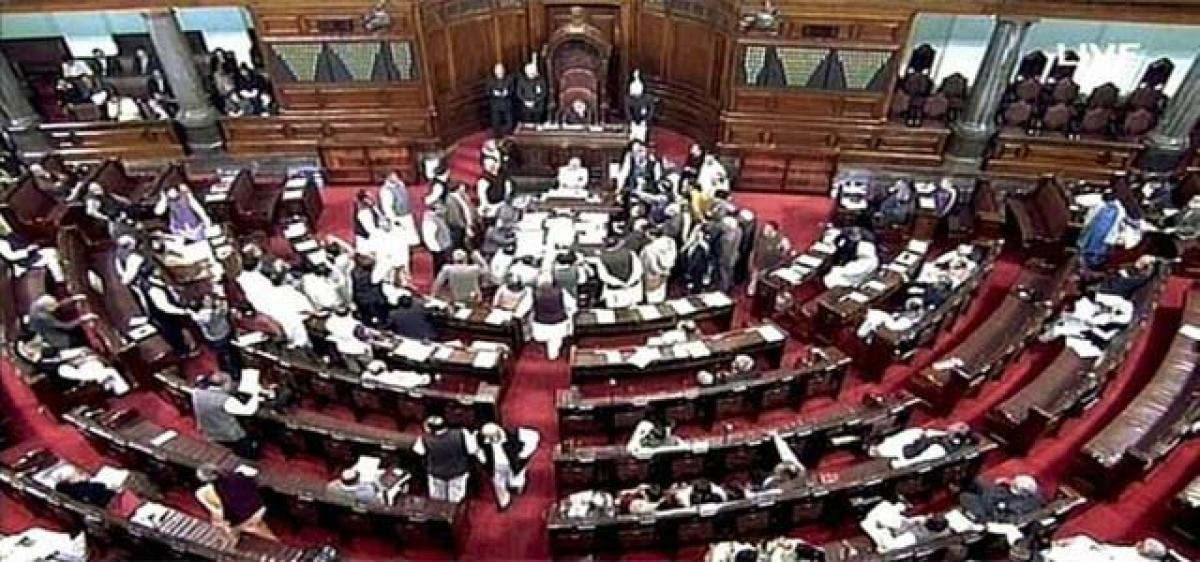Live
- Jhansi says she will focus on holistic development of Vizag
- What Sam advocated
- Congress swings into damage control
- Pitroda's inheritance tax remarks fuel fresh attack
- Dharmavaram: A mastermind that played a spoilsport for TDP rivals
- KCR launches poll bus yatra
- Revanth dares KCR, Harish
- Modi frustrated, afraid of invisible voters: Kharge
- SC seeks clarification from EC on functioning of EVMs
- Vijayawada: ‘People disgusted with YSRCP govt, seek change’
Just In

Just two more days are left for the winter session of the Parliament to conclude sine die. Going by the way it functioned, as a prisoner of competitive politics, little positive could be expected in these two days.
Just two more days are left for the winter session of the Parliament to conclude sine die. Going by the way it functioned, as a prisoner of competitive politics, little positive could be expected in these two days. The disruptions, deviations, storming the podium and the high decibel levels – that have become a norm rather than an exception for whatsoever reasons lead to a deja vu experience. The blackness of it all as well as the dismal void it leaves in us is unthinkable.
Whether or not demonetisation is a historical decision is to be seen, but the hysterical reaction to the same that disallowed any business of both the Houses leaves much to be desired. Human brain is supposed to work as a dual processor that divides its work between rapid, automatic decisions and more deliberate judgments. In the case of the law makers, it seems to work just one way and refuses to deliberate on its judgments.
No one would deny that demonetisation has not caused untold hardships to the common man. The long queues have not ebbed. Money meant to be in circulation is being hoarded more than any. A new frugal lifestyle is being evolved by the cash-strapped society. However, all this has not brought unity in House to debate and discuss the ground reality for the larger good of the nation.
The Opposition has been consistent in demanding a discussion on demonetisation in the Lok Sabha under a provision that paves way for voting. In the Upper House, they have been insisting on an apology from the Prime Minister, Narendra Modi. Rahul Gandhi promised an explosive speech but kept his knowledge to himself claiming he is not being allowed. Prime Minister attended the Lok Sabha, but the House failed to take up the discussion.
The Treasury benches, too, preferred to disrupt the business to prevent the Opposition from getting an upper hand. Amid the 'tu tu, main main" politics, veteran Parliamentarian L K Advani rebuked his colleagues and the Speaker for not managing the House better. President Pranab Mukherjee criticised the Opposition for stalling the business. Former Prime Minister Dr Manmohan Singh was presented in the House to take on the government on its "ill-advised move" and the economist did not shy away from giving a piece of his mind to the politician Modi.
Three crucial legislations related to the Goods and Services Tax Bill are currently awaiting Parliament's approval, so that roll-out of the new tax regime can be a reality by April 1, 2017. When the House was disrupted on Coal scam, the then Parliamentary Affairs Minister, Pawan Kumar Bansal reminded the BJP during the previous regime: "Parliament should not be taken to 11, Ashoka Road (BJP's headquarters) or television studios.
Allow Parliament to function in Parliament office," adding that each minute of the House cost the exchequer Rs 2.5 lakh. Does it not hold good now? India's history and identity focuses on the traditions of public debate and intellectual pluralism, as Amartya Sen puts it. Alas, both are absent today! Why is the Aam Aadmi not a part of the political agenda in this country?

© 2024 Hyderabad Media House Limited/The Hans India. All rights reserved. Powered by hocalwire.com







